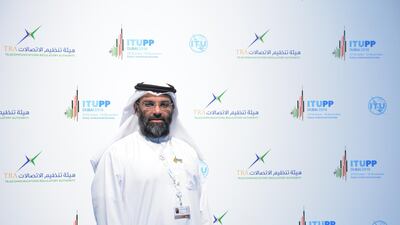The Telecommunications Regulatory Authority of the UAE assigned 5G frequencies to telecom operators at speeds of 3.3 gigahertz to 3.8GHz, as the country ramps up its digital transformation.
Fifth-generation technology, or 5G, will offer consumers and businesses three benefits: greater speed, lower latency and the ability to connect several devices at once.
"We have already assigned 5G frequencies for the operators that will be from 3.3GHz to 3.8GHz," said Tariq Awadhi, executive director of the spectrum management affairs at TRA.
“This year, Etisalat and du have been officially allocated 100 megahertz each to establish a 5G network. To begin with, they have started establishing it commercially on a small scale. Currently, it is available for home broadband.”
The TRA, which regulates the UAE’s telecom sector and enables government entities in the field of smart transformation, said more partnerships with the private sector will ensure enterprises have better understanding of the benefits of 5G. “The UAE is not only ready for 5G but it has already started execution and assigning frequencies. But 5G business model is different than 3G or 4G … it’s not only about mobile and data,” Mr Awadhi said.
“We need to have effective partnerships between operators and use case verticals including in industries such as transportation, health, agriculture and education. Various countries have started doing it at different levels.”
Telecom operators in the UAE stand to gain an additional $3.3 billion (Dh12.1bn) in revenues by 2026 from the digitalisation of industries with 5G technology, according to a report from Swedish telecom company Ericsson.
“Most of the private sector still needs to know how they can be benefited. They need to see, experience and use it before ascertaining how 5G can help them in reaping good results,” said Mr Awadhi.
___________________
Read more:
As 5G takes off, 2G and 3G still stay underutilised, says ITU director
Global digital inclusion vital to ensure full benefits of 5G
____________________
“Our operators Etisalat and du have already started building the network. We have done some really successful trials at Gitex and at various areas in Abu Dhabi and Dubai that were assigned to our operators… The speed was very high with very low latency.”
5G is expected to be commercially available by 2020 as all stakeholders are waiting for the World Radiocommunication Conference 2019 (WRC-19) – which reviews and revises global radio regulations – held towards the end of next year at Sharm El Sheikh in Egypt.
“WRC-19 will decide which frequency will be assigned for 5G or IMT-2020, as we call it. However, our work is on with Etisalat and du to ensure we have complete coverage of the entire Expo 2020 venue with the 5G network,” said Mr Awadhi.
5G is also known as IMT-2020, a term developed by the UN organisation International Telecommunication Union, to develop the vision for 2020 and beyond.
The ITU has set a timeline that calls for the standard to be structured by 2020.
The development of 5G will enable big data transfers between machines, Internet of Things, and expand the speed and capacity for new services that meet the requirements of digital transformation and smart government.
Moreover, initiating the technology will enable the UAE to achieve its global competitiveness objectives, particularly its goal of achieving the top spot in the global Online Services Index.
The country was ranked sixth this year, and was among the top 10 in the Network Readiness Index, which evaluates the scope and quality of government online services.
“The road to 5G is not an easy journey. We need to bring various entities – both government and private – on a common platform. Moreover, standards and frequencies have not been finalised yet,” said Mr Awadhi.
“To ensure we are on the same page in the region, we are pursuing things through ASMG [Arab Spectrum Management Group] that functions under Arab League.”
Mr Awadhi, who is also chairman of ASMG, said the next meeting in Amman next month will focus on the issue of standardisation.


